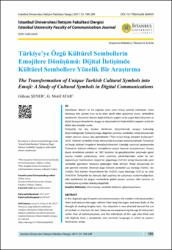| dc.contributor.author | Şener, Gülcan | |
| dc.contributor.author | Atar, G. Motif | |
| dc.date.accessioned | 2019-10-20T21:13:19Z | |
| dc.date.available | 2019-10-20T21:13:19Z | |
| dc.date.issued | 2017 | |
| dc.identifier.issn | 1302-633X | |
| dc.identifier.uri | https://dx.doi.org/10.17064/iuifd.364939 | |
| dc.identifier.uri | https://hdl.handle.net/11421/19282 | |
| dc.description | WOS: 000424523500007 | en_US |
| dc.description.abstract | In this digitized age of speed and communication, the modern individual prefers short and concise messages, refrains from long messages, and even balks at the thought of reading lengthy texts. Our attention is now directed toward the use of symbols as shortcuts for text. Today we are experiencing the age of interaction rather than of communication, and the individuals of this age who think and talk digitally have a completely new common language in which to express themselves: emoji. In Turkey, four out of five people now use emoji in their communication ("Turk insani hangi emojileri kullaniyor?", 2015). Taking this into consideration, one may question the lack of symbols which accurately reflect Turkish values on emoji keyboards. Cultural symbols are rarely portrayed in the world of emoji. The goal of this study is to assess the demand for "emojification"of Turkish cultural symbols and determine the appropriate symbols to use in cultural interaction in Turkey. The data was gathered from a sample of 1001 participants through quantitative questionnaires, and was analyzed using a general scanning model. The majority of participants (91.8%) stated they would like localized symbols to be included on Turkish emoji keyboards. The most requested localized cultural symbols for Turkey were tea glasses (68.5%), raki (58.8%), Turkish coffee glasses/coffee-fortune-telling (55.9%), the evil eye talisman (51.3%), and simit (45.9%). As no previous research on this subject was found in Turkey, this study may prove valuable in allowing these symbols to represent national Turkish qualities to the global market and may also be important in the field of national representation and branding. | en_US |
| dc.language.iso | tur | en_US |
| dc.publisher | İstanbul University | en_US |
| dc.relation.isversionof | 10.17064/iuifd.364939 | en_US |
| dc.rights | info:eu-repo/semantics/openAccess | en_US |
| dc.subject | Localized/National Emoji | en_US |
| dc.subject | Symbolic Communication | en_US |
| dc.subject | Glocal Marketing | en_US |
| dc.title | The Transformation of Unique Turkish Cultural Symbols into Emoji: A Study of Cultural Symbols in Digital Communications | en_US |
| dc.type | article | en_US |
| dc.relation.journal | Istanbul Universitesi Iletisim Fakültesi Dergisi | en_US |
| dc.contributor.department | Anadolu Üniversitesi, İletişim Bilimleri Fakültesi | en_US |
| dc.identifier.issue | 53 | en_US |
| dc.identifier.startpage | 189 | en_US |
| dc.identifier.endpage | 209 | en_US |
| dc.relation.publicationcategory | Makale - Uluslararası Hakemli Dergi - Kurum Öğretim Elemanı | en_US] |


















